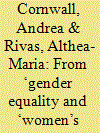| Srl | Item |
| 1 |
ID:
137743


|
|
|
|
|
| Summary/Abstract |
The language of ‘gender equality’ and ‘women’s empowerment’ was mobilised by feminists in the 1980s and 1990s as a way of getting women’s rights onto the international development agenda. Their efforts can be declared a resounding success. The international development industry has fully embraced these terms. From international NGOs to donor governments to multilateral agencies the language of gender equality and women’s empowerment is a pervasive presence and takes pride of place among their major development priorities. And yet, this article argues, the fact that these terms have been eviscerated of conceptual and political bite compromises their use as the primary frame through which to demand rights and justice. Critically examining the trajectories of these terms in development, the article suggests that if the promise of the post-2015 agenda is to deliver on gender justice, new frames are needed, which can connect with and contribute to a broader movement for global justice.
|
|
|
|
|
|
|
|
|
|
|
|
|
|
|
|
| 2 |
ID:
183865


|
|
|
|
|
| Summary/Abstract |
In 2010, as the Afghan government announced its intention to begin a formal peace process, there were numerous calls for women to have a seat at the table. Both mainstream and critical discourse on women and the peace process in Afghanistan, however, relied on the production of essentialized subjectivities which failed to recognize the political and social complexity of women's lives, diminished their intellectual contributions and silenced their voices. This article challenges the simultaneous hyper-visualization and silencing of Afghan women by both Afghan and international actors. Drawing on feminist and decolonial theory, we examine the ways in which the colonial mechanisms of intervention, patriarchy and the global hierarchies of knowledge production worked in tandem to marginalize Afghan women while upholding them as agents of peace. The article brings together findings from three participatory research projects on women and peace, which took place from 2010 to 2014 across eight provinces in Afghanistan. A prismed view of the participants' intersectional realities is constructed, which highlights diverse positionalities and articulations of peace, the social and political cleavages, and differentiated obstacles to their involvement in the peace and reintegration process. The concluding remarks emphasize the relevance of these findings for Afghanistan at the time of publication.
|
|
|
|
|
|
|
|
|
|
|
|
|
|
|
|